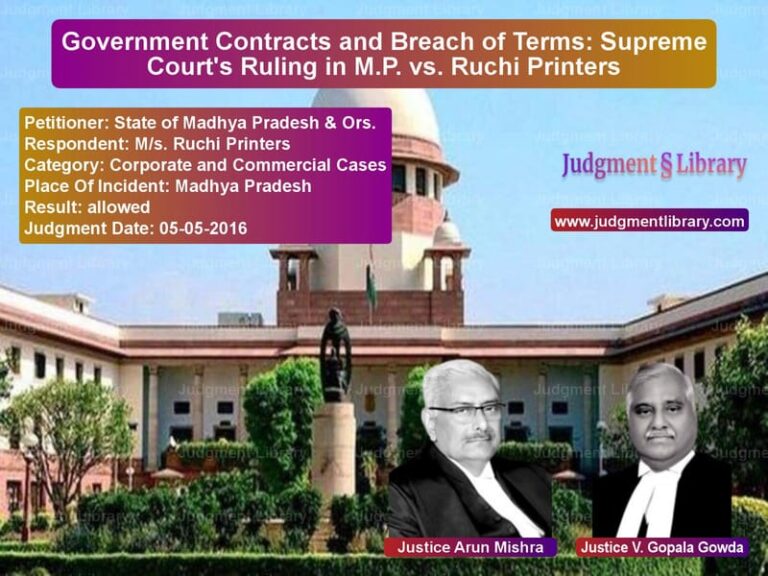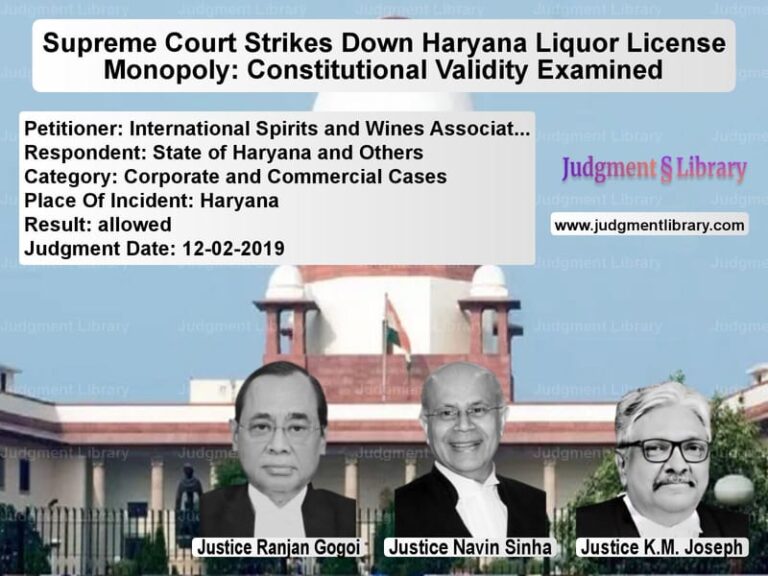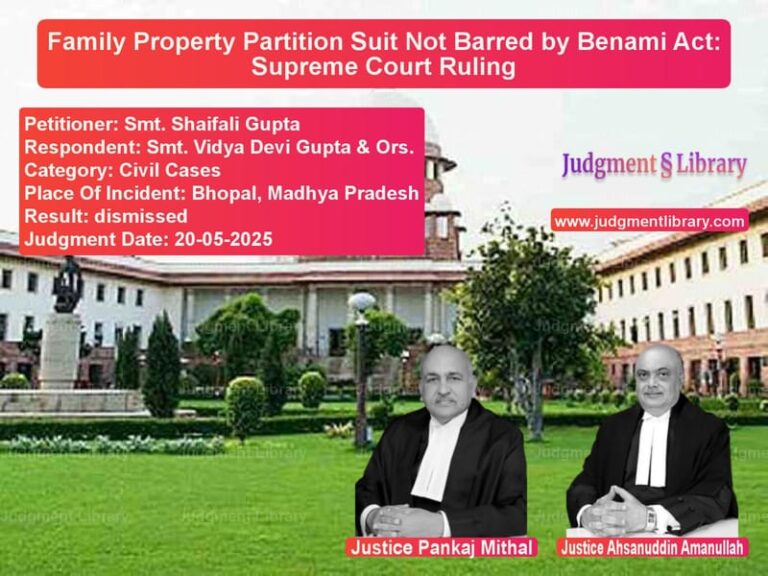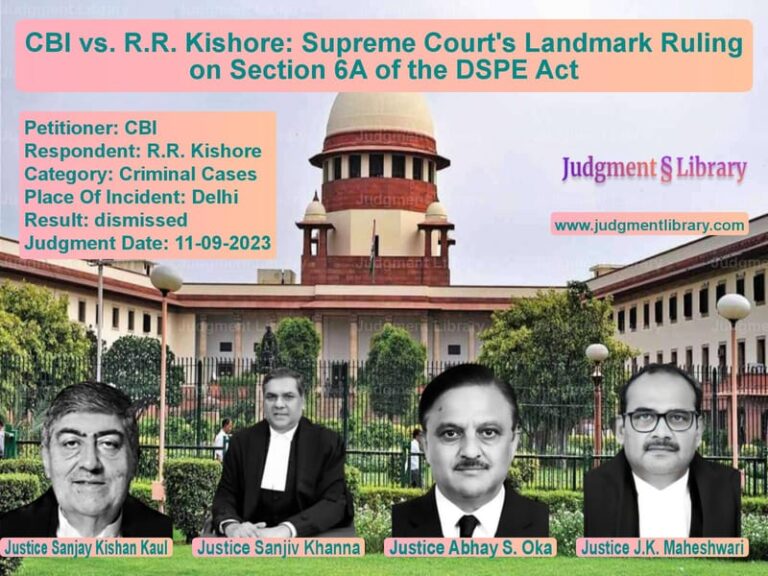Legal Distinctions Between Wakfs and Public Charitable Trusts: Analysis of the Maharashtra State Wakf Board Case
The ongoing legal disputes surrounding the classification and regulation of Wakfs and Public Charitable Trusts under Indian law have been at the center of recent litigation. This case, involving the Maharashtra State Board of Wakfs and multiple respondents, brings forward the complexities of the application of the Wakf Act, 1995, and its intersection with the Bombay Public Trusts Act, 1950. The judgment critically examines whether certain Muslim public trusts should be treated as Wakfs, leading to an analysis of the procedural issues in the creation and operation of the Maharashtra State Wakf Board.
The case traces its roots back to the enactment of the Wakf Act, 1995, which sought to establish a more effective regulatory framework for Wakfs across the country. The Maharashtra government took significant steps towards implementing this law by appointing a Survey Commissioner in 1997, forming the Maharashtra State Board of Wakfs in 2002, and conducting surveys of Wakf properties. However, the crux of the legal battle emerged when various public charitable trusts, particularly those created by Muslims, were being considered for classification as Wakfs under the Act, sparking a series of legal challenges.
The dispute escalated when the Charity Commissioner issued a circular on 24th July 2003, declaring that Muslim trusts registered under the Bombay Public Trust Act should not be tried under the Wakf Act. This led to multiple writ petitions filed against the circular, with petitioners arguing that their institutions, though Muslim-run, were not Wakfs and should not be subject to the regulatory oversight of the Wakf Board. The Maharashtra State Wakf Board, in response, insisted that these institutions were indeed Wakfs under Muslim law, thus subject to the regulatory framework of the Wakf Board.
At the heart of the petitioners’ arguments was the distinction between a Wakf and a Public Charitable Trust. The petitioners argued that the institution in question was a public charitable trust, created under the Bombay Public Trust Act, 1950, with specific legal attributes that distinguished it from a Wakf. For instance, they pointed out that a Wakf, according to Muslim law, is a permanent and irrevocable dedication of property to religious, charitable, or pious purposes, and once the property is dedicated to a Wakf, it cannot be alienated or owned by the founder. In contrast, a charitable trust, while also dedicated to charitable purposes, does not necessarily have the same permanent or inalienable characteristics.
The legal distinction between Wakfs and Public Charitable Trusts was further complicated by the ambiguity surrounding the classification of certain properties as Wakf properties. The respondents contended that many properties originally intended for public charitable purposes were mistakenly classified as Wakf properties during the survey conducted under the Wakf Act. The dispute over the classification was central to the case, as it involved whether properties that were not originally dedicated as Wakfs under Muslim law should be subjected to the jurisdiction of the Wakf Board.
The Supreme Court, in its analysis, referred to the history of the Wakf Act and the Bombay Public Trust Act, examining their interplay. The Court explored the legislative intent behind the creation of the Maharashtra State Wakf Board and the procedures for recognizing and managing Wakf properties. It also scrutinized the issue of whether the formation of the Wakf Board itself was legally sound, given that it was constituted without first completing the survey of Wakf properties as required by the Act. This issue became pivotal, as the High Court had earlier held that the incorporation of the Board was flawed due to the absence of a completed survey report, which was seen as a precondition for the establishment of the Board under the Wakf Act.
In a significant portion of the ruling, the Court also addressed the legal implications of the circular issued by the Charity Commissioner, which had initially restricted the application of the Wakf Act to only those institutions that were registered as Wakfs. The petitioners argued that their institutions, although registered as Muslim public trusts under the Bombay Public Trust Act, should not be classified as Wakfs under the Wakf Act. This was particularly important as the legal framework for the management of Wakf properties is significantly different from that for public charitable trusts. The Court reviewed the provisions of the Wakf Act and its application to various forms of Muslim charitable institutions, concluding that while the Act offers a comprehensive mechanism for the regulation and administration of Wakfs, it should not automatically extend to all Muslim public charitable trusts.
The Supreme Court, after detailed deliberations, overturned certain findings of the High Court, particularly regarding the illegality of the incorporation of the Wakf Board and the classification of properties. It held that the Wakf Board’s formation did not violate the procedural requirements of the Act, particularly as the Government had the discretion to establish the Board even before the completion of the survey. The Court also rejected the petitioners’ argument that the creation of separate Boards for Shia and Sunni Wakfs was mandatory under Section 13(2) of the Wakf Act, finding that the use of the word ‘may’ in the Act gave the Government discretion, not an obligation, to form separate Boards based on the number of Shia Wakfs.
The Court also discussed the role of the Wakf Tribunal in determining the status of various properties, acknowledging that while the initial survey might have flaws, the legal recourse for aggrieved parties was to approach the Tribunal for resolution. The judgment emphasized the importance of ensuring that the Wakf Board operated within the bounds of the law while balancing the interests of the Muslim community and other stakeholders in the management of Wakf properties.
In conclusion, the judgment in the Maharashtra State Wakf Board case represents a significant step in clarifying the legal landscape surrounding the classification and regulation of Wakfs and public charitable trusts in India. It highlights the complexities involved in managing religious and charitable endowments and the need for a clear distinction between the two categories. While the judgment upholds the constitutional validity of the Wakf Act and the functioning of the Wakf Board, it also underscores the importance of due process in the classification and management of Wakf properties, ensuring that the rights of institutions and individuals are not infringed upon unjustly.
Petitioner Name: Shaikh Yusuf Bhai Chawla & Ors..Respondent Name: Maharashtra State Board of Wakfs.Judgment By: Justice C.T. Ravikumar, Justice B. R. Gavai.Place Of Incident: Maharashtra, India.Judgment Date: 19-10-2022.
Don’t miss out on the full details! Download the complete judgment in PDF format below and gain valuable insights instantly!
Download Judgment: shaikh-yusuf-bhai-ch-vs-maharashtra-state-bo-supreme-court-of-india-judgment-dated-19-10-2022.pdf
Directly Download Judgment: Directly download this Judgment
See all petitions in Company Law
See all petitions in Corporate Governance
See all petitions in Public Interest Litigation
See all petitions in Arbitration Awards
See all petitions in Mediation Cases
See all petitions in Judgment by C.T. Ravikumar
See all petitions in Judgment by B R Gavai
See all petitions in partially allowed
See all petitions in supreme court of India judgments October 2022
See all petitions in 2022 judgments
See all posts in Corporate and Commercial Cases Category
See all allowed petitions in Corporate and Commercial Cases Category
See all Dismissed petitions in Corporate and Commercial Cases Category
See all partially allowed petitions in Corporate and Commercial Cases Category







